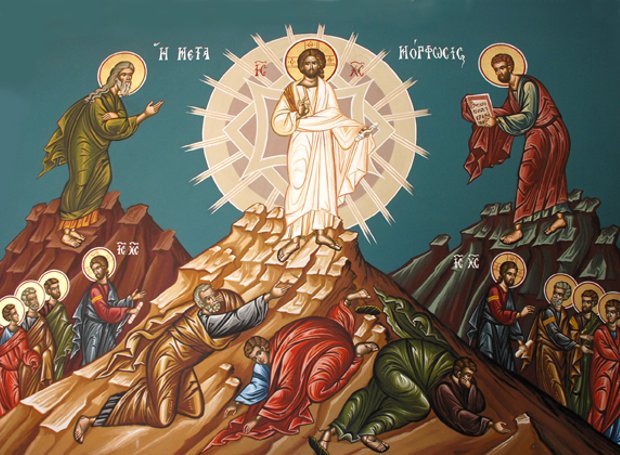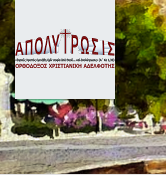Translated excerpts from the book:
Στεργίου Ν. Σάκκου [Read CV], «Λάμψον καὶ ἡμῖν...», ἐκδ. «ΧΡΙΣΤΙΑΝΙΚΗ ΕΛΠΙΣ» ΟΡΘΟΔΟΞΗ ΑΔΕΛΦΟΤΗΤΑ, Θεσ/νίκη 2023.
A Fact of Our Personal History
 The historical event of the Transfiguration, as the Fathers of our Church emphasize, did not take place only once. It is an event of the past, the present, and the future. It is an event of the life of Christ, which occurred “at that time” on the holy mount of the Transfiguration, but also a reality that unfolds within the present course of history. This is confirmed by countless transfigured souls, who speak of their experience with a sweetness, a joy, and an exultation beyond expression. Furthermore, it is also a future event for every believer, who looks forward to a new transfiguration when he meets Jesus at the end of the world. The more he prepares himself each day through spiritual transfiguration for that final encounter, the more fully he will partake forever in the vision of the glorious Lord.
The historical event of the Transfiguration, as the Fathers of our Church emphasize, did not take place only once. It is an event of the past, the present, and the future. It is an event of the life of Christ, which occurred “at that time” on the holy mount of the Transfiguration, but also a reality that unfolds within the present course of history. This is confirmed by countless transfigured souls, who speak of their experience with a sweetness, a joy, and an exultation beyond expression. Furthermore, it is also a future event for every believer, who looks forward to a new transfiguration when he meets Jesus at the end of the world. The more he prepares himself each day through spiritual transfiguration for that final encounter, the more fully he will partake forever in the vision of the glorious Lord.
Spiritual Transfiguration (part 1)
The consistent living of the Christian life advances and spiritually transfigures the believer. Yet it requires his wholehearted spiritual struggle. This struggle is not driven by impersonal moral commandments but is inspired by the love of Christ. The recognition of this love, and the longing to respond to it, urges the believer to rise above his own desires and to submit to the will of God. Such submission becomes the offering most acceptable to God, offered in return for the saving sacrifice of our Lord Jesus Christ. This is precisely the sacrifice urged by the apostle Paul at the beginning of the twelfth chapter of the Epistle to the Romans; “I appeal to you therefore, brethren, by the mercies of God, to present your bodies as a living sacrifice, holy and acceptable to God, which is your spiritual worship. Do not be conformed to this world but be transformed by the renewal of your mind, that you may prove what is the will of God, what is good and acceptable and perfect” (Rom 12:1–2).
Having demonstrated in the first part of the Epistle—the theological section (chapters 1–11)—that Jesus Christ is the only Savior and Redeemer of all people, both Jews and Gentiles alike, the Apostle now calls upon the faithful to offer their own sacrifice in return for Christ’s redeeming sacrifice. That is, to present themselves as a living, holy, and acceptable sacrifice to God.
He does not, of course, mean the destruction of their bodies. As Theodoret explains: “For he does not command the bodies to be slain, but rather to be dead to sin.” What is required is the mortification of sin—the spiritual worship—which consists not in the offering of irrational animals, but in two things: love and purity (cf. Jas 1:27). Interpreting this apostolic exhortation, Saint John Chrysostom poses the question: “How can the body become a sacrifice? Let the eye look upon nothing evil, and it has become a sacrifice. Let the tongue speak nothing shameful, and it has become an offering. Let the hand do nothing unlawful, and it has become a whole burnt offering. Or rather, these are not sufficient; we also need acts of charity: that the hand may perform almsgiving, that the mouth may bless those who mistreat us, and that the ear may be constantly occupied with the hearing of the words of God.” We offer spiritual worship, as Saint Theophylact sums up, “when no irrational passion holds sway within us, when each person becomes the high priest of his own self and slaughters within him his vices.”
Yet in the world in which we live, we encounter many obstacles that prevent us from offering this spiritual worship unhindered. That is why the apostle Paul makes a second appeal: “Do not be conformed to this world but be transformed by the renewal of your mind.”
“To be conformed” means “to take on the same form,” the same outward appearance (see Phil 2:8). The Apostle instructs the faithful: you must be different; you must not be carried away by the worldview and way of life of “this present age”, of the world that surrounds you. That world has as its “ruler” the devil (see Eph 6:12), for it willingly submits to him. You, however, must not adopt its philosophy or its manner of living (cf. Jn 17:15–16; 1 Jn 2:15–17). If the faithful become identical in all things with the godless world, how will they fulfill the mission entrusted to them by the Lord: to be “the light of the world” (Mt 5:14), “lights in the world” (Phil 2:15)? If they yield to the influence of others, how shall their own life exert any influence upon the world around them? Worldliness—making compromises in order to please the desires of the world—will have disastrous consequences, both for their own spiritual life and for the society in which they live.
The motto of the first Christians, as we read in “The Didache of the Twelve Apostles”, holds true in every age: “Let grace come, and let this world pass away!” Against the world! Just as living fish swim against the current, while the dead are carried away by it. Against the world that constantly wears us down, distorts us, estranges us from God! Against the enticements, the demands, the fashions of the world!
Especially in our days, we all face the danger of worldliness, which assails us with the terrible flood of the pursuit of well-being and a life of ease. In truth, it has affected us all. It has wounded us deeply and holds us bound in chains; we can no longer find the strength to cast off its yoke. It would be good for us to ask ourselves often: “Am I truly a Christian?” Do I walk with Christ along the narrow and “hard” way, or do I follow the world along the wide and easy road? (see Mt 7:13–14).









